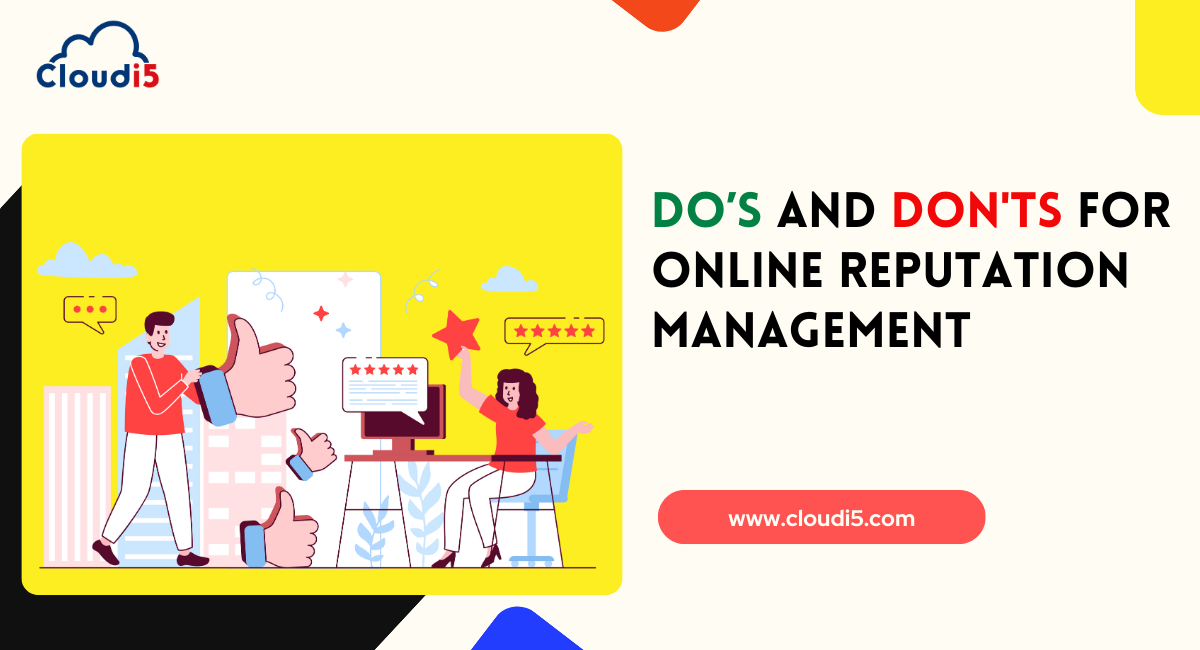
Dos And Don'ts Of Online Reputation Management
In today's world of technology, one important tool that can build or break your business is your online reputation. It's not only advantageous but also essential to preserve a solid internet image when it comes to digital marketing services. It's the overall opinion that consumers have about your company based on everything they read, hear, and see online. Online reputation management (ORM) has consequently grown to be a crucial component of any effective business plan. Your reputation affects your credibility in the eyes of partners, investors, and the larger online community, in addition to influencing the decisions of potential clients.
We will go over the main tactics and common mistakes that can improve or damage your brand's reputation online in this article.
Dos for Online Reputation Management:
1. Do Monitor Your Online Presence:
A digital marketing company needs to establish and sustain a positive online reputation. Effective online reputation management starts with routinely keeping an eye on what people are saying about your business on different websites. Information moves at the speed of light in the realm of digital marketing services so that views can change drastically in a short amount of time. By keeping a close eye on brand-related discussions, reviews, and comments, you may learn a lot about how your audience regards you.
It is essential to have the proper tools and techniques for efficient online monitoring. You may receive instant notifications regarding mentions of your brand on social media, news stories, blogs, forums, and other online platforms by using online monitoring tools such as Google Alerts, Mention, and Brandwatch. With the help of these tools, you can monitor discussions pertaining to your brand and promptly take necessary action.
2. Do Encourage Positive Reviews:
One effective strategy for improving your online reputation is to ask happy clients to write good reviews. Positive customer reviews can act as significant testimonials for your firm, and satisfied customers can be your most powerful brand advocates. Consider using tactics like customized follow-up emails or messages to solicit these reviews proactively. Thank them for doing business with you, and please ask for their input. Offering direct connections to review industry-specific sites or to review platforms like Google and Yelp is vital in order to make the procedure as smooth as feasible.
3. Do Respond to Feedback:
Online reputation management requires responding to both good and negative customer reviews. Whether it's to voice a complaint or convey satisfaction, customers who take the time to offer feedback are reaching out to you.
Reacting positively to compliments not only conveys gratitude but also encourages loyalty and a sense of community. Create a closer relationship with happy consumers and entice them to become brand evangelists and repeat customers by showing appreciation and personalization in your responses.
On the other hand, responding to criticism is just as important, if not more so. It gives you a chance to show how dedicated you are to making customers happy.
Effective online reputation management requires the creation of thoughtful, professional responses to any consumer criticism. You can demonstrate that you value their criticism and are committed to making changes by answering sympathetically, recognizing their worries, and providing answers or clarifications. Reactively responding to feedback—both favorable and negative—is crucial to building your brand's credibility in the digital age, when online evaluations and opinions are highly valued.
4. Do Create high-quality content:
Creating informative and insightful content that showcases your brand's expertise is essential to managing your online reputation successfully. There are numerous advantages to such material for your brand. Additionally, since search engines value well-written, educational content, it can raise your ranks.
Think about writing educational articles and blog posts that answer often-asked concerns or difficulties at your business. Tutorials and how-to guides are also quite beneficial because they let your audience see your expertise in action and offer them useful solutions. Compiling movies, infographics, and pictures can make difficult subjects easier to understand and more interesting. Establish a content calendar and follow it; whether it's for daily, weekly, or monthly pieces, consistency is essential. Using these suggestions and best practices for content development helps improve your online reputation and keep visitors interested in what you have to offer.
5. Do Optimize for SEO:
Your SEO tactics significantly impact your online reputation. Optimizing your brand for search engines is the aim of search engine optimization, which goes beyond simply getting your website to rank higher in search results. A wider audience can view and access your website and content more easily when they are search engine optimized. Because of this, when people are looking for information about your business or products, they are more likely to find you online. Content marketing in SEO and its importance must be balanced in the digital landscape.
To make sure your content appears highly in search results, you must put good SEO methods into practice. Keyword research is crucial, first and foremost. Determine the terms and phrases that people in your target audience are most likely to use to find content similar to yours. After you've chosen these keywords, carefully include them in your writing, making sure to include them in the title, headings, and body of the text.
6. Do Build a Strong Social Media Presence:
You can actively interact with your followers on social media, answering their questions and acknowledging their compliments. Sustaining a robust and genuine social media presence demonstrates openness and reachability, both of which are critical for establishing credibility. Posting insightful and useful content on social media establishes you as a leader in the field and highlights your experience.
For reputation management to be effective, one must keep up a cheerful and interesting presence on social media and other online platforms. First and foremost, consistency is essential. Updating your material frequently keeps readers interested and informed. It's important to maintain a brand voice that is consistent with your values and the expectations of your audience while keeping your tone polite and professional. In order to guarantee that your material is still visible and pertinent, keep updated on platform-specific trends and algorithms.
Don'ts of Online Reputation Management:
Don't Ignore Negative Feedback:
Negative reviews or comments can have a negative impact on your online reputation if you ignore them. If negative feedback is not addressed, it can fester and worsen, possibly doing more harm than good. Ignoring criticism implies that you don't care about customer pleasure or that there is some validity to the criticism. This might damage credibility and discourage prospective clients from doing business with you.
Online reputation management requires that problems should be resolved as soon as possible. You may show that you are dedicated to providing exceptional customer service and that you value customer feedback by swiftly addressing complaints raised by customers. This not only reassures the individual who brought up the concern but it also shows other prospective clients that you are attentive and proactive. Quick problem-solving can help you keep your good internet reputation intact by preventing a small issue from becoming a major one.
Don't engage in online arguments:
Engaging in public disputes with clients or critics is a dangerous route in online reputation management. These conflicts have the potential to get out of hand and seriously damage your business swiftly. Participating in public arguments frequently presents your company in a bad light since it can be interpreted as combative, defensive, and unprofessional. It's crucial to keep in mind that, in the digital era, a single public dispute incident can go viral and be remembered for a very long time. It's best to handle issues carefully and professionally, seeking solutions without worsening the matter rather than getting into arguments.
First, privately express your concerns to the person in question via email or direct message. Demonstrate compassion and a sincere willingness to find a solution. Grab the chance to hear them out, comprehend their viewpoint, and present them with ideas or concessions to help resolve their problems. If the conflict arises in a public setting, think about providing a courteous, impartial response before directing the conversation to a private setting so you can respond to their concerns in greater depth and individually.
3. Don't Post Offensive or Controversial Content:
The reputation of your brand may suffer greatly if you produce and distribute offensive or divisive content. In addition to offending and alienating your audience,this type of stuff might undermine your credibility and reputation. In the era of social media, controversial information may spark criticism and backlash, which can swiftly go viral and seriously harm a person's reputation.
Before releasing any information, it's important to carefully analyze its potential impact and make sure it fits both your audience's expectations and your beliefs. This will help preserve your brand. You can secure your online reputation and keep the confidence of your partners and consumers by taking a proactive stance that places a high priority on the creation of ethical content.
4. Don't buy Fake reviews and followers:
Purchasing fake followers or reviews has serious ethical and legal consequences. From an ethical standpoint, it is an obvious attempt to mislead consumers and influence public opinion. This technique impacts the competitive landscape, which makes it more difficult for honest enterprises to succeed, in addition to creating a false impression. Purchasing fake followers or reviews might have serious legal consequences.
First of all, there may be serious reputational harm from these acts. When detected, they undermine credibility, destroy trust, and taint the image of your brand—often irreversibly harming your online reputation. Legal consequences are also another major worry. Purchasing fake followers or reviews may be against the terms of service on several online platforms, consumer protection laws, and legislation regarding misleading advertising. Legal action, fines, or other consequences may follow from this.
5. Don't Neglect Privacy and Security:
Protecting consumer data and online assets is crucial in the digital marketing sector, since data is not only valuable but also essential to many operations. Customers entrust you with sensitive data. Therefore, protecting it is essential to earning their trust in addition to being your moral and legal duty.
Maintaining your online reputation is essential to reputation management, particularly in the ever-evolving field of digital marketing. To guard against vulnerabilities, patch and update your content management system, plugins, and website frequently. Put strong Cyber security measures in place, such as intrusion detection systems, firewalls, and antivirus programs. Keep a close eye on your internet presence by employing tools to find any mentions, reviews, or conversations about your business. Provide a concise, flexible action plan for handling unfavorable comments or any emergencies. Make sure you frequently back up your important digital assets to reduce the chance of data loss from technological malfunctions or hackers. By using these pointers, you may continue to have a robust and consistent online presence that enhances your standing in the field of digital marketing.
Conclusion:
In conclusion, sustaining trust, credibility, and success in the digital sphere all depend on the effective management of one's online reputation. Businesses and individuals can take proactive measures to safeguard and improve their internet reputation by abiding by the dos and don'ts.
Trusted By












Leave Comments